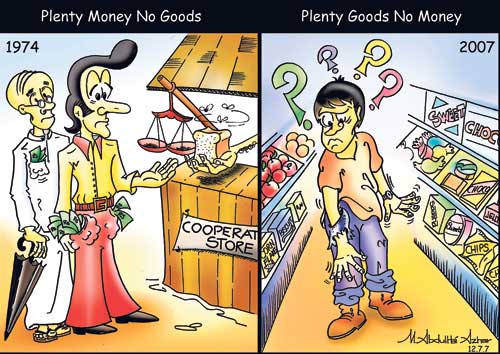
30 years later, The Sunday Times FT poll shows … Success in the free market
Thirty years after Sri Lanka embraced the free market, a poll by The Sunday Times FT shows that an overwhelmingly majority agree that the open economy has succeeded and is the best development path. But interestingly many of the respondents, when asked whether the ethnic conflict had retarded development, were of the view that corruption, poor leadership, leftist politicians, indiscipline and lack of vision would anyway have pulled the countrydown! “Conflict is only one factor. Leftist politicians would still have ruined the growth,” and “Not with our corrupt politicians” were among the responses to this question in the poll which drew respondents from a wide section of the business community, professionals and civil society. Another respondent argued that GDP was also kept up by war expenditure. “Without war there wouldn’t have been much GDP to talk about,” a private sector executive contended implying that defence spending and war-related costs are part of the attributes of GDP. Liberalisation came after the United National Party won parliamentary polls on July 21, 1977. In a more comprehensive analysis inside, The Sunday Times FT spoke to economists, civil society leaders, politicians, academics and people on the street for their views on whether the free market has succeeded or not for Sri Lanka. According to the poll, nearly 94 percent said the free economy had brought benefits; 91 percent said Sri Lanka would have done better if there was no conflict; 66 percent said Sri Lanka would have been an Asian Tiger if not for the war; and 68 percent said the local industry was affected by free market forces. The respondents were however clearly in favour of liberalization and the free market. Yet veteran industrialists like Patrick Amarasinghe, a pioneer in the rubberwood furniture business that ultimately couldn’t withstand liberalisation, felt the reforms were too fast and didn’t give enough time and a chance to the local industry to develop skills and enhance quality. Former Ceylon Chamber of Commerce Chairman Chandra Jayaratne said the free market had succeeded but argued that there are many problems relating to the policy framework. The JVP and some civil society leaders were understandably critical of the reforms saying it had ruined agriculture, industry and culture particularly through television and western ideals. The analysis also showed that the free market enhanced the role of women, who represent little over 50 percent of the population, in the economy but continue to be marginalised in the decision-making. Two sectors that grew after liberalisation were the migrant worker industry and apparel exports, both Sri Lanka’s biggest foreign exchange earners. This together with the plantation sector, the biggest export before 1977, illustrates the powerful role women the post 1977 economy, analysts said. |
|
||
| || Front
Page | News
| Editorial
| Columns
| Sports
| Plus
| Financial
Times | International
| Mirror
| TV
Times | Funday Times|| |
| |
Copyright
2007 Wijeya
Newspapers Ltd.Colombo. Sri Lanka. |
